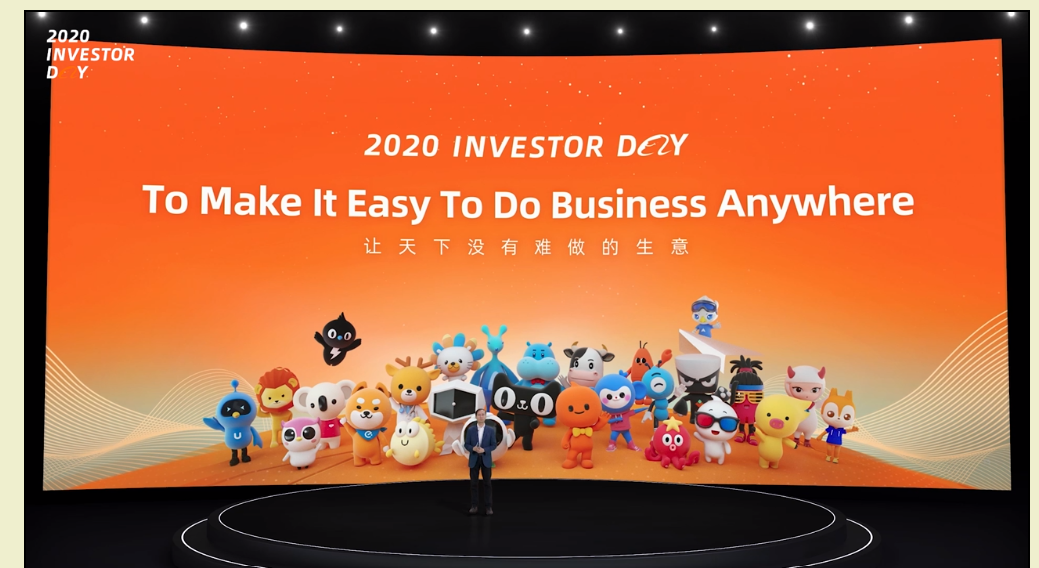M+E Connections

Alibaba CEO: Cloud Computing’s One of the Company’s Three Key ‘Growth Engines’
Story Highlights
Alibaba sees cloud computing and data intelligence as one of its three key “growth engines,” Daniel Zhang, the company’s CEO and chairman said Sept. 29 during the Alibaba Investor Day webcast.
The company also expects its Alibaba Cloud business to “become profitable this year after 10 years of investment,” he said, echoing the projection disclosed by Alibaba CFO Maggie Wu a few minutes earlier.
Alibaba’s other two growth engines are domestic consumption and globalization, according to Zhang.
The Digitalization Driver
When it comes to China consumption of economic goods, “digitalization has been a significant driver in which Alibaba is playing an instrumental role,” Zhang said at the start of his presentation.
In the 12 months ended June 30, 2020, Alibaba’s “digital economy in China generated over $1 trillion” in gross merchandise value in U.S. dollars, he noted.
“Digitalization is being embraced by consumers, manufacturers, retailers and brands across China’s economy,” he said, adding: “In the midst of so many uncertainties” brought on by the pandemic, “the future of digitalization is the biggest certainty we can see.”
Calling digitalization the “biggest opportunity of our time,” he said: “We can all see that digitalization is the future and it is unstoppable…. We believe digitalization is a historic opportunity, which Alibaba is best-positioned to capture.”
Over the past few months, “digitalization played an enormous role in our collective fight against COVID-19 and facilitated the subsequent resumption of business activities” in the country, he said.
A major reason was that “remote working requirements have made online collaboration a new normal for the workspace,” he noted, adding: “We’ve been helping millions of organizations to collaborate and run their day-to-day operations on the cloud…. From day one, [Alibaba] has been committed to one mission: to make it easy to do business anywhere and the key to deliver that mission is digitalization.”
Over the past 20 years, Alibaba has been “leveraging digital technology,” he pointed out, noting the combination of technology and commerce is making it easy to do business anywhere and “make our mission a reality, [and] digitalization is the means to that end.”
Alibaba’s “capability to keep innovating” is a major reason it believes “we’re best-positioned to capture the opportunity presented by digitalization,” he said, adding: “Alibaba’s capability to keep innovating has been the most important driver of our continuous growth over the past 20 years.”

Alibaba’s Cloud Vision
Meanwhile, “we envision the cloud will become a new type of infrastructure, which will help all industries go digital and enable new industries to emerge and innovate in a digital environment,” Zhang predicted.
The company is “redefining cloud computing to integrate data with commerce and business use cases,” he noted.
Alibaba’s cloud computing and data intelligence business has “already achieved considerable scale but we still regard ourselves to be in the nascent stage of the global cloud era,” he said, adding: “We believe this is an industrywide opportunity across all sectors – the kind of opportunity that comes only once in a generation.”
Eleven Alibaba Strategies
The company plans to “drive future growth by implementing these 11 strategies around” its three growth engines, Zhang went on to say:
- Continue to grow its digital economy user base.
- Expand consumption categories and consumer wallet share in its digital economy.
- Develop new supply categories and “supply-side transformation” based on consumer insights.
- Create or redefine online/offline retail formats leveraging its digital technology.
- Upgrade the company’s Alipay third-party mobile and online payment platform from “digital check out” to “digital check in.”
- Empower consumer brands to achieve end-to-end digital operation leveraging the Alibaba Business Operating System.
- Transform the entire logistics supply chain to digital and intelligent operation.
- Upgrade all enterprise IT structure to cloud.
- Transform the approach to work to cloud-based collaboration.
- Build industry solutions based on cloud and big data and intelligent applications for sectors such as retail, financial services, public sectors, transportation and healthcare.
- Expand the Alibaba digital ecosystem to the global market.
By 2036, the company intends to serve 2 billion consumers globally, create 100 million jobs and enable 10 million businesses to be profitable, Zhang added.









